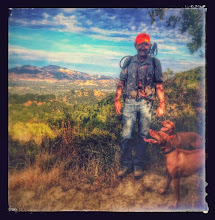By: Dr. Nicholas Dodman and Dr. Alice Moon-Fanelli
Bailey puts up with some of it, but will let the other dog know in no uncertain terms that he will not be dominated.
The whole four pages is a excellent read for owners of assertive and self-confident Vizslas on what to look for in inter-dog relationships.
Click here to go to article:
Article on Inter-Dog Dominance Aggression
Extracted from above article.
"Dogs fight for a number of different reasons but dominance, in one form or another, underlies much of this feuding. When a couple of unfamiliar dogs encounter each other there is a good deal of mutual investigation that occurs between the two dogs before either can fully relax in the other's presence. During this investigational stage, all five senses are utilized to gather information about the competition and a variable amount of posturing goes on as the dogs transmit their comfort level toward each other through the medium of body language. If two easygoing dogs meet, there is rarely a problem. If one dog is clearly dominant over another, and the other dog accepts his dominance, again there is no real reason for concern. The more dominant dog transmits his status to the other by certain characteristic posturing and expressions.
Perhaps the most well known signal is the dominant dog's stare. Other signals of dominance include tensing of muscles, erect ears, tail held at or above horizontal, and the head and neck held high. The approach of the dominant dog is often toward the other dog's flank, and upon reaching it, he may rest his chin upon the other dog's back almost daring him to react.
A clearly subordinate dog will defer to a show of force by averting his eyes, shrinking down to make himself small, holding his tail either low or tucked between his legs, and may even squat and urinate or roll over to expose his belly in extreme situations. At the instant the dominant dog has received the signal of deference, he immediately stops posturing and may start playing with the other dog.
Problems arise when two dogs of near equal dominant status meet and the true leader is not immediately apparent. In signaling dominance, dogs may stand parallel to each other, facing the opposite direction, each with his head resting on the other's rump and each with his tail raised like a flag. Next may come a low growl, lip lift, snap, or even bite. If neither dog concedes, a dogfight will ensue, and winner takes all.
In an entirely appropriate battle, the dog that eventually emerges as the dominant individual immediately accepts the underdog's concession. The dominant dog may laud his victory for a few seconds before strutting off but will usually not sustain or escalate his attack under these circumstances. Some dogs, however, are not savvy regarding canine etiquette and will continue to attack despite the other dog's obvious submission. Such dogs usually have a checkered history of improper socialization with other dogs or have had adverse experiences with similarly dysfunctional dogs in the past.
A dominant dog may behave well in the presence of nine out of ten other dogs because the others either defer or are even more dominant. Occasionally, however, such a dog will encounter another dog of almost identical dominance status and that's when the trouble begins. As two owners stand chatting, not paying much attention to their dogs, a fight may suddenly break out."
Further research:


.JPG)









4 comments:
Outdated nonsense.
Science of Dogs. Great name. How about an updated reference?
RBD
How do you correct the dominent aggressive behavior? I am finding it nearly impossible to walk my dog due to the fact that she is incredibly dominent with other dogs and almost always tries to instigate a brawl with another dog(s). I have tried leash correction, placing her on her back (which can be a challenge when she is in her dominent-aggressive state), as well as an electric collar (both vibrate and shock functions) with NO improvement. I remain as calm as possible, but am beginning to dread our walks because I am afraid a dog fight in the near future is inevitable. I have kids and i fear a dog fight may lead to my kids getting hurt. Any advice you have would be helpful :)
Pack Mother,
Find a professional dog person quick. Many out there that understand dogs. I am learning and if I had your dog out in the field I could maybe help. Can't tell from what you have told here. You can e-mail me directly at rodneymichaelson@yahoo.com
RBD
Post a Comment